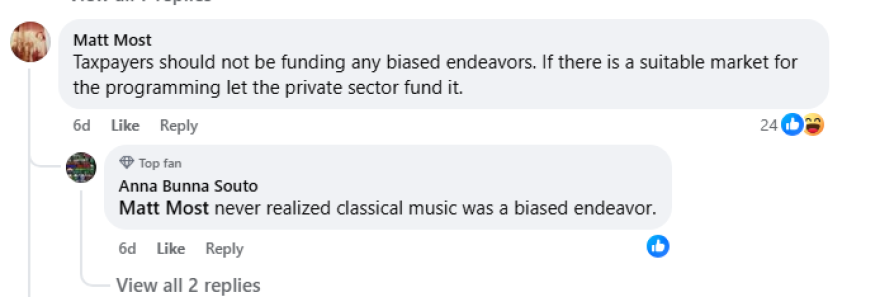Note: a version of this piece originally appeared in the Traverse City Record-Eagle as part of the "Tuning In" series.

In July, Congress approved a rescission package that cut all federal funding for public media in the United States, effective immediately.
The people who supported this rescission had a lot of critiques of NPR specifically, and they didn’t want their tax dollars ($1.60 per year, to be specific) to support NPR’s news reporting.
I’ve shared excerpts of a few emails IPR has received throughout this essay, along with screenshots from various social media comments related to IPR's loss of federal funding.
“PBS and NPR started more liberal left wing reporting and tongue in cheek promoting Marxism, Democratic Socialism, no difference there. When my tax money supports unfair, biased reporting, that only irritates my family more.” - Mike W.
The veracity of these and other specious claims about NPR’s coverage are beyond the scope of this essay (see Proverbs 26:4-5), as is a conversation about PBS, which operates separately from NPR.
But I work side by side with IPR’s local journalists and can tell you that their only agenda is making sure the public hears interesting stories about issues affecting northern Michigan.
What I’m here to say is this: The push to take away federal funds from NPR was done without realizing or caring how local stations like Classical IPR would be affected.
NPR itself only got about 1% of its funding from federal sources. Instead, local stations like IPR will bear the brunt of this defunding. Until this month, IPR received 14% of its annual funding from federal sources, or about $300,000 per year.
“You should apologize for the liberal, slanted view and say that you are ashamed of yourselves.” - Donald B.
The singular focus on allegations about NPR’s news reporting during the rescission process meant that the value and utility of other public media services were overlooked.
Intentional or not, it means that classical music stations like IPR are going to suffer consequences that had been intended for NPR’s news reporting.
Case in point: more than 90% of classical music on the radio in the United States is heard on public radio stations.
“We are thrilled that Congress finally cut off Federal subsidies for PBS and NPR, who are obsessed with ‘diversity’ in all kinds of iterations.” - Louis Z.
For years, Classical IPR’s programming has focused on local classical music. We broadcast recordings of local ensembles, promote local concerts and interview local artists. We love our local community and how alive and thriving the classical music scene is here.
I wish it didn’t feel like Classical IPR and other classical public radio stations were casualties in a fight over federal funding that had nothing to do with local music content.

Classical IPR’s path forward is uncertain, but we have short- and long-term plans. Listeners gave or committed over $400,000 since mid-July, and we are incredibly grateful. We hope to not only survive the loss of our federal funding but to also come out more secure than ever in a few years.
To those who have supported us and continue to support us, thank you. To those happy with our loss of funding, I wish you all the best and hope you never have to face anything like this.
Amanda Sewell is IPR's music director. Reach her at amanda.sewell@interlochen.org






